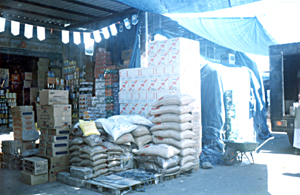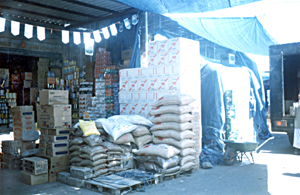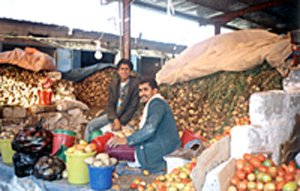
Saudi Products Invades Yemeni Market [Archives:2000/50/Business & Economy]
December 11 2000
Its impossible these days not to notice the Saudi products flooding the Yemeni markets whether legally imported, or smuggled. Products such as electronics, spare parts, electricity generators, perfumes and medical stuff.
Retailer Abdah Mershid Amer described the flow of Saudi products into the Yemeni market as commercial invasion which allowed those legal or even smuggled products to be present in every market in big cities and in villages as well. Not only competing with local products, consequently reducing its sales, but also creating a state of unbalance in commercial exchange between the two countries. Statistics show the exchange ratio approaches 70% in favor of Saudi products reaching a value of 200 million dollars, that too without taking the smuggled products into consideration.

Total worth of legally imported products through Saudi Arabia
More than 450 million dollars is dedicated every year for importing goods from Gulf, Arab and Europe countries through Saudi Arabia.
That was what sources of the ministry of supply and trade told the Yemen Times. However there arent any figures telling us about smuggled goods.
It was added that because of the policy of foreign trade liberation followed according to the Yemeni economic reform program, private sector traders encouraged the flow of the Saudi products in order to fulfill the demand of the Yemeni market. Which caused less opportunity for local products to find place compared with cheaper Saudi products.
Consumption capacity in Yemen
Merchant Fawaz Saleh Ahmed from Alhasaba Commercial Market, said that the large consumption capacity of the Yemeni market and the fact that 2 million of the population were at some time living in Saudi Arabia, was the primary reason that encouraged importing Saudi products which has a good reputation in Yemen. While at the same time like some is not happening with the Yemeni merchants with respect to the Saudi market.
All that those importers care for is how to make more money in less time regardless of whether this act would cause harm to the Yemeni economy, that its the industrial and agricultural sector only who should be concerned. he exclaimed,
Saudi Products in the Yemeni Markets
Although, The Economic Reform program implemented by the government since 1995 aims at increasing Yemeni exports, yet the opposite has been happening. This is because of the low quality of industrial and agricultural products that encouraged private commercial sectors to import Saudi products, in order to cover the need in the Yemeni market for those products. Starting with building materials passing by entertainment and electronic devices and ending with food stuff and soft drinks.
Its the brand
Consumer Abdullah Hamood Al-Noor told YT that those products have high qualities and they prefer buying them because they know that Saudi producer doesnt counterfeit in producing such products.
Despite the fact that Yemeni products are almost similar to Saudi ones but consumers see them as imitations of Saudi products which they prefer. That led forty factory owners to declare bankruptcy and to close down the factories two years ago being unable to compete with imported products.
Smuggled materials
The major problem, Yemeni markets are suffering from is the enormous quantities of smuggled goods. Middlemen from both sides smuggle goods like electronics, medicines, spare parts, perfumes and many other things and sell them in Yemen at prices less than legally imported goods.
Merchants confirm that this dual smuggling harms both countries, confuses commercial exchange and affects profits of private sector.
People coming from Hardh border check point told YT that middlemen smuggle qat, live stock, honey and Yemeni cigarettes to the Saudi side. Even laborers to work in the southern parts of the kingdom. Smuggling usually takes place at night, using donkeys and cars. Smugglers avoid custom check points at the borders.
The Tragedy!
The flow of smuggled goods into the Yemeni market has effected negatively Yemeni industrialists and agricultural producers both financially and sentimentally. They found their products in a tough competition with cheaper and better-made imported cum-smuggled products. While the Yemeni products have no market in Saudi Arabia.
When questioned, Yemeni industrial sources said that the production high cost of industrial and agricultural products doesnt allow us to export those products to the Saudi markets. And this is due to the absence of government financial support as well as the existence of primitive means of production. Shortage of water led to the decrease of fruit and vegetable production.

Action needs to be taken
Sources from the Yemeni Industrial and Agricultural Chamber told YT that the Saudi – Yemeni agreement is to eliminate all obstacles in the way of exports , avoid dual taxation, prevent tax evasion and facilitate people and goods transportation. And this requires practical measures taken by the Coordination Council in the two countries that treat the unbalanced commercial exchange. The government should study the reasons which led to the decline in Yemeni exports and try to treat them scientifically.
If the Yemeni-Saudi relations were to flourish on economical basis equally benefiting the two parties, first of all the 283 million dollars due to the Saudi Kingdom should be settled down, and they both should together try to eliminate all obstacles in the dual partnership of trading between the two countries. Saudi Arabia should inaugurate preservation centers in its markets, for Yemeni agricultural products to be distributed afterwards in that country, exactly the same way Saudi products are treated in Yemen.
——
[archive-e:50-v:2000-y:2000-d:2000-12-11-p:./2000/iss50/b&e.htm]


